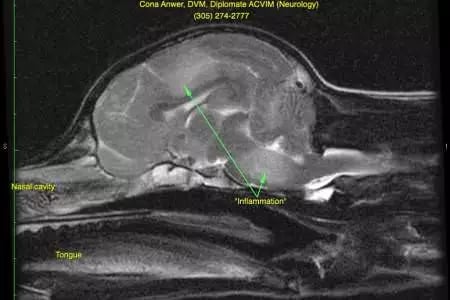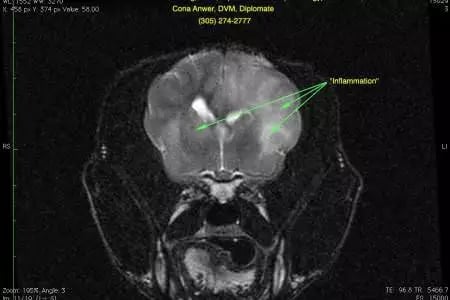Charlie
Canine Seizures, Encephalitis
Home » Case Studies » Charlie
Charlie is a 3-year-old Maltese mix. He presented to his primary care veterinarian for seizures. Blood work was performed and phenobarbital was prescribed. He did well for a month. He was normal and did not have any seizures. About five weeks after his first seizure, he started to show behavioral signs. He was lethargic, did not want to play, and seemed “lost” at times. He had four seizures in one day and was seen at the local emergency center. They examined him and sent him to Southeast Veterinary Neurology (SEVN).
On examination at SEVN, he was dull. Charlie did not respond to people or to normal stimuli. He did not respond to visual stimuli from his right eye but did respond in the left eye. He did not respond to touching the right side of the face (in both the right nostril and on the side of the face near the eyelids).
He tended to turn his head toward the left, and when testing his knowledge of where his feet are (called “postural reactions” or “CP’s”), he does not respond on the right side of his body.
Based on Charlie’s examination, a problem affecting the left front part of the brain (cerebral cortex) was suspect. Magnetic resonance imaging (MRI) was performed. The first image is of Charlie’s head in profile. The nose is toward the left and the top of the head is toward the top of the picture. The second image is made 90 degrees to the other image as if Charlie’s nose was coming out of the computer screen. The right side of the picture is the left side of Charlie’s head. The brain is in the middle of the picture. The bright areas within the brain (arrows) represent inflammation, also called encephalitis


Encephalitis in dogs is typically autoimmune. It typically is NOT due to an infection, is not something that is contagious, and is not something that people can get from their dog. Treatment is immune suppression with medications. We are happy to report that Charlie made a full recovery and is doing well.
Here are the Important “Take Home” Points from Charlie:
- Seizures can be caused by problems outside of the brain, problems inside the brain, or idiopathic epilepsy. Seizures combined with an abnormal neurological examination strongly suggest a problem within the brain.
- Encephalitis in dogs is typically autoimmune and is one of the most common causes of brain disease in adult, smaller-breed dogs.
- Many dogs that are dramatically affected – even those that might appear ‘brain dead’ can have a good outcome if diagnosed appropriately and treated aggressively.
- MRI is the diagnostic test of choice for diagnosing all causes of brain disease including encephalitis, stroke, tumors, and others.